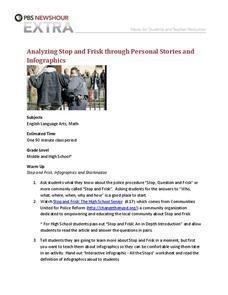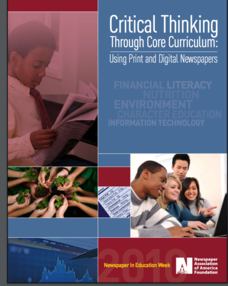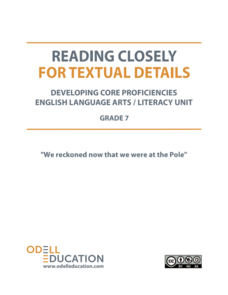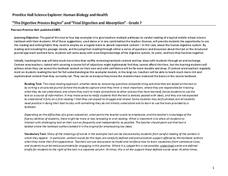J. Paul Getty Trust
Looking and Learning in the Art Museum — Lesson 3
Curator, artist, art handler, archivist, conservator-restorer, guide. Who would have thought there were so many different kinds of museum professionals? After a visit to an art museum, class members reflect on the role of the museum in...
Fluence Learning
Writing Informative Text: Did Shakespeare Write Shakespeare?
William Shakespeare penned some of the richest and most fascinating works of literature—or did he? Middle schoolers read three brief informative passages and conduct additional research to evaluate the claim that Shakespeare did not...
Channel Islands Film
Once Upon a Time (Saxipak’a): Lesson Plan 4
How did the environment and natural resources found on the Channel islands influence the culture of the Chumash? Archaeology meets technology in an activity designed for middle schoolers. After viewing West of The West's documentary Once...
Channel Islands Film
Santa Cruz Island Restoration Narrative
What would you be willing to do to save an animal from extinction? After re-viewing a video about the restoration of the Island Fox on Santa Cruz Island, individuals adopt the point of view of one of the key players in the...
California Education Partners
Vincent Van Gogh
Living in someone's shadow would be difficult for anyone, including one of the most talented artists of the modern age. Middle schoolers read an excerpt from Vincent Van Gogh: Portrait of an Artist by Jan Greenberg and Sandra Jordan...
Reed Novel Studies
Dolphins of the World
Pair a novel study of Island of the Blue Dolphins by Scott O'Dell with a presentation on dolphins. The 37-slide PowerPoint shows different types of dolphins all around the world, includes a brief description of each, and provides a photo...
Federal Reserve Bank
Lesson 1: Katrina Strikes
Most families have an emergency kit in their home with flashlights, water, and extra food. But what happens to your money when disaster strikes? An economics lesson focused on the aftermath of Hurricane Katrina in 2005 demonstrates the...
Tech Museum of Innovation
Launch It!
Launch a activity on flight with a challenging resource that asks scholars to first brainstorm and test ways to move a ping pong ball with given materials, then apply the results to design a launcher for them.
Project WET Foundation
The Water Cycle
Explore all things water cycle in a truly engaging interactive. Water enthusiasts look at water as a system. They label the parts of the water cycle as they learn about them in a hands on activity, and then participate in a game where...
Project WET Foundation
Explore Watersheds
What makes a watershed? What are the natural and human features of a watershed? How do human features affect watersheds? Where can I find my local watershed? These questions are thoroughly explained in an informative watershed interactive.
Project WET Foundation
Investigate Fresh Water
It's all about freshwater in this water interactive! Users navigate through freshwater habitats such as lakes, rivers, and wetlands, taking note of the animals that live there. They also look at a desert habitat for comparison....
Project WET Foundation
Use Water Wisely
What's the point in saving water? Surprisingly water isn't a forever resource because it is a natural resource. Here, young water conservationists hunt for 23 wise water users and water wasters by clicking on the people in the...
Project WET Foundation
Discover Our Ocean
A very informative interactive presents ocean zones, estuaries, hot water vents, phytoplankton, coral reefs, sea turtles, kelp forests, and all things that thrive in the ocean.
Project WET Foundation
We All Use Water
How many ways is water used? Indirect and direct water use are the two main ways humans use water, but the usage comes in many forms. Animals, agriculture, industries, transportation, and many more rely on water for different uses....
Project WET Foundation
The Blue Planet
What a neat interactive that interacts with the amount of water on Earth's surface. It begins with a brief audio introduction of the Blue Planet and how it got its name. Then, users click on the activity to play a game...
Project WET Foundation
Healthy Water Healthy People
People and water have something in common. They both need to be healthy. Explore with an engaging interactive what it means to have a healthy body and why having healthy water is also important.
World Intellectual Property Organization
Learn from the Past, Create the Future: Inventions and Patents
3D printers, selfie sticks, smart watches. GPS, self-driving cars, YouTube. Imagine life without inventions. Believe it or not, these items were all invented in the last 10 years. Inventions, and the inventors responsible for them,...
Civil War Trust
Contrasting the North and South before the War
Learners create a standing cube with four panels that display information on the North and South's economy, geography and climate, society, and means of transportation before the Civil War. Through discussion and reading...
PBS
Analyzing Stop and Frisk Through Personal Stories and Infographics
How much can you learn about an important topic from a single image? High schoolers analyze an infographic that represents the number of stops performed during the Stop and Frisk police procedure. After building background information...
Newspaper Association of America
Critical Thinking through Core Curriculum: Using Print and Digital Newspapers
What is and what will be the role of newspapers in the future? Keeping this essential question in mind, class members use print, electronic, and/or web editions of newspapers, to investigate topics that include financial...
Read Works
Canine Courage
Did you know dogs had an important job on September 11th, the day airplanes took down the World Trade Center? Learn more about the furry heroes with a three-page informational read designed to aid pupils in answering 10...
Odell Education
Building Evidence-Based Arguments: “Doping can be that last 2 percent.”
Even the most thrilling sports career can end in an asterisk if the player uses performance-enhancing drugs. Focused on the topic of doping in sports, a seventh grade unit breaks down the arguments for and against steroids in five...
Odell Education
Reading Closely for Textual Details: Grade 7
Enhance the reading experience with a set of lessons designed to improve textual analysis. Seventh graders use guiding questions to read both informational text and literature closely in the first part of the unit. Next, they work on...
Savvas Learning
"The Digestive Process Begins" and "Final Digestion and Absorption"
Want your class to digest text more thoroughly? Middle schoolers learn about the digestive system in the lesson and reinforce informational text reading skills through a variety of strategies. They engage in a close reading...

























